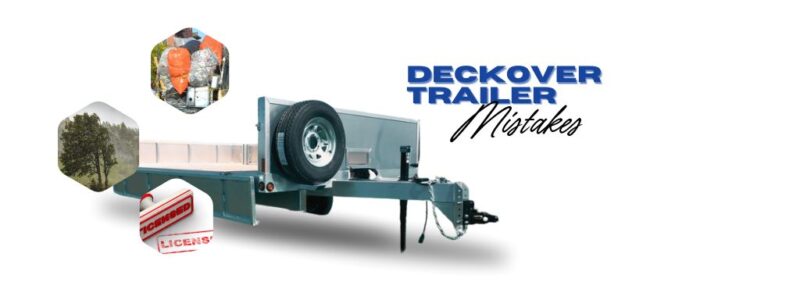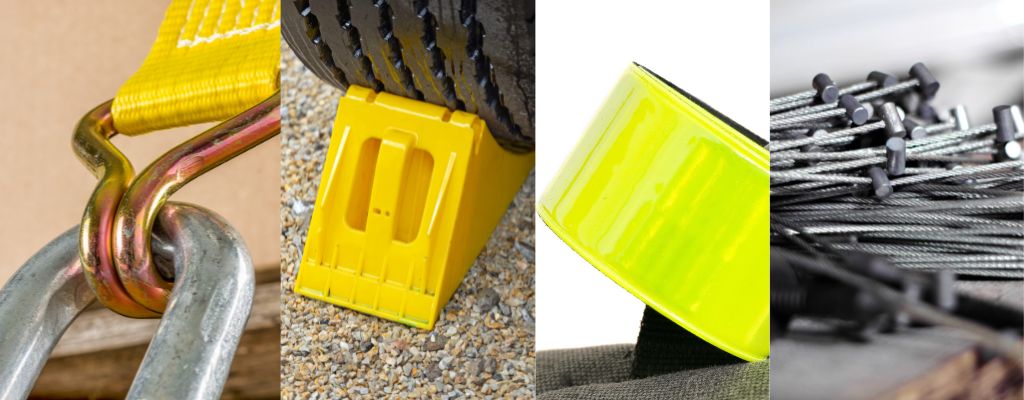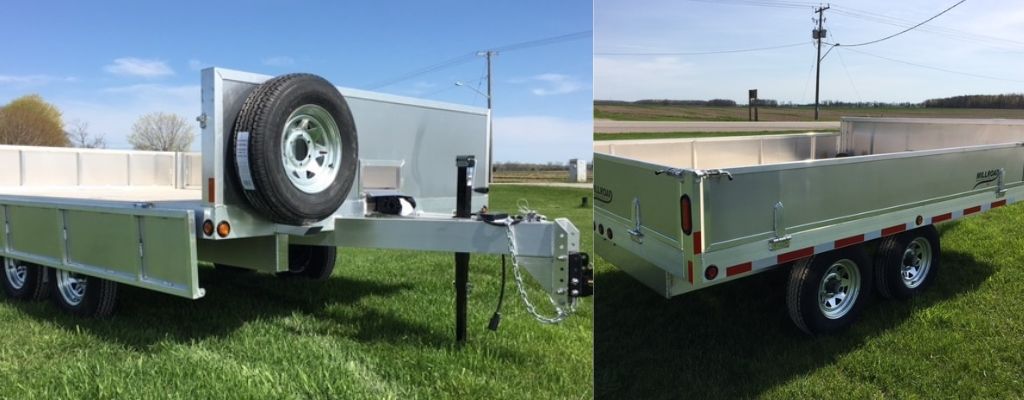
April 11, 2025 Last updated on June 16, 2023 by Bob Fisher Bob Fisher Deckover Trailers
Avoiding deckover trailer hauling mistakes is crucial for keeping your cargo safe and your trips smooth. At Millroad Manufacturing, we’ve spent years perfecting our aluminum deckover trailer designs, and along the way, we’ve gathered invaluable insights into the common deckover trailer errors and solutions.
Whether you’re transporting construction equipment, ATVs, or wide material loads, understanding deckover trailer safety tips for hauling can save you time, money, and frustration. Here’s our guide to the 10 most common mistakes and how to avoid them to ensure safer, more efficient hauling.
One of the most frequent mistakes we see trailer owners make is overloading their deckover trailers. It can be tempting to pile on extra materials, but your trailer and towing vehicle both have specific weight limits for a reason. Overloading increases the stress on your towing setup, reducing the trailer’s lifespan and compromising your safety on the road.
Each deckover trailer has a Gross Vehicle Weight Rating (GVWR), which is the maximum total weight it can handle, including the trailer itself, cargo, and any additional equipment or attachments. Exceeding this limit can lead to tire blowouts, suspension failure, or even structural damage to the trailer.
To avoid this mistake, always know the GVWR of your deckover trailer and double-check your load’s total weight before hitting the road. Investing in a simple portable scale can help you stay underweight and compliant. At Millroad Manufacturing, our trailers are designed with durable aluminum to keep them lightweight, saving you some leeway to load heavier cargo while remaining within allowed limits.
Another common hauling error is failing to distribute the weight evenly across the deck. An improperly balanced load—whether it’s too heavy at the front, back, or one side—can cause swaying, fishtailing, and difficulty steering your vehicle. This is a recipe for disaster, especially if you’re hauling heavier or oversized loads on highways or uneven roads.
Proper weight distribution means placing heavier items near the centre of the deckover trailer, directly over the axle line. This prevents excessive weight from bearing down on the trailer hitch or causing your trailer to tip. For side-to-side balance, ensure the items are spaced evenly across the width without leaving one side disproportionately loaded.
Take time to secure your load properly with straps, chains, or tarps to minimize shifting. Our Millroad deckover trailers offer wider decks with no fender obstructions, which makes arranging bulky items evenly a breeze. Trust me—taking the extra time to stabilize your load will save you headaches on the road!
Failing to keep your trailer in optimal condition is another mistake we see too often. Just like your car, your deckover trailer requires regular maintenance to stay safe and functional. Trailer components like tires, axles, brakes, lights, and the hitch need periodic inspections and care.
Neglected maintenance can lead to things like tire flats, brake failure, or busted lights, leaving you stranded mid-haul or subject to fines. For example, trailer tires often wear out faster than you realize. A tiny crack in the rubber could lead to a dangerous blowout at high speeds.
To avoid this, create a routine maintenance checklist. Inspect tire pressure, ensure brake systems are in proper working order, and check your hitch connections before every trip. Once a year, your deckover trailer should get a complete inspection from a professional repair shop. With Millroad’s rust-resistant aluminum trailers, you can forget about worrying over corrosion and painting, but regular checkups are still necessary!
Trailer owners often overlook the legal side of hauling. Depending on where you’re located, certain deckover trailer sizes or weight limits may require specific permits or licensing upgrades. Ignoring this can lead to hefty fines and potential liability risks.
Each province or state enforces its own regulations for trailer operations. For example, heavier trailers may require an upgraded license class, and some jurisdictions mandate additional signalling if your trailer is over a certain length. Failing to comply with these laws not only puts you at risk but can void insurance claims if issues arise during a haul.
Research the requirements in your region and ensure all your paperwork is in order. At Millroad Manufacturing, we always recommend checking these details before purchasing a deckover trailer to avoid any surprises down the road.
A towing vehicle that doesn’t match the specifications of your deckover trailer is another mistake we frequently see. Not all vehicles are equipped to handle the demands of hauling, and using an underpowered or incompatible vehicle can lead to unsafe conditions and performance issues.
When pairing your trailer with a towing vehicle, ensure it has the appropriate towing capacity and hitch rating for the loads you plan to haul. Overloading a light-duty truck or SUV can damage the engine, transmission, or suspension. Conversely, using a too-large vehicle may result in wasted fuel and unnecessary wear and tear.
Many deckover trailers from Millroad are built to be lightweight while offering impressive strength, making them compatible with a wider range of towing vehicles. Be sure to review your trailer’s weight fully loaded and match it with the vehicle’s tow rating for a seamless experience.

Safety gear is not optional when hauling with a deckover trailer, yet too many owners underestimate its importance. From wheel chocks to reflective tape, every safety item plays a role in securing your trailer, cargo, and fellow travellers on the road.
Key safety gear includes:
Investing in the right safety equipment is a minimal cost compared to the potential damages of ignoring it. Our Millroad trailers are designed to accommodate all modern safety accessories, keeping you ready for any scenario.
Driving with a deckover trailer requires skill, and some mistakes only come to light when you’re out on the road. First-time owners often hit the highway without practicing maneuvers like reversing, turning, or parking, leading to costly or even dangerous situations.
Before embarking on a long haul, spend some time practicing with an unloaded trailer in an open, safe area. Get comfortable with wider turns, the trailer’s stopping distance, and reversing with limited visibility. Make it a point to learn how to straighten out if your trailer starts to jackknife.
Millroad decks are specifically designed for confident transport, with features like an extended width for easier side loading access. However, even with the best trailer, practice makes perfect when hauling safely.
One mistake too many drivers make is assuming they can maintain regular speed limits when hauling a trailer. This misconception can lead to accidents due to limited braking power or trailer sway.
Many areas enforce lower speed limits for vehicles with trailers, typically around 10-20 km/h below the regular limit. Adhering to towing speed limits not only keeps you compliant but also ensures you maintain control over the load, especially on highways or in adverse weather.
Be mindful of speed signs and plan your route with extra transit time to account for slower speeds. Safety should always take priority over getting to your destination quickly.
Weather plays a huge role in hauling, yet it’s often overlooked by trailer owners. Rain, wind, and icy conditions can drastically impact your ability to control the trailer and maintain safety.
High winds can cause trailer sway, while rain or ice reduces traction, increasing stopping distances. Planning ahead and adapting your driving to the weather is crucial for preventing incidents. Equip your towing vehicle with appropriate tires and consider hauling only during favourable conditions.
The final yet critical mistake is failing to secure all loose items, both on the trailer and inside the towing vehicle. Unsecured cargo can shift during transit, destabilizing the load and posing risks to other vehicles on the road.
Double-check that everything on the trailer is firmly tied down. Use tarps or netting to prevent smaller items from falling off, and ensure that anything stored inside your vehicle won’t shift and impact operational controls.
With a wide, open deck design, Millroad deckovers simplify securing a wide range of cargo. Spend the extra time ensuring everything is tight and secure—it’s well worth the effort.

Mistakes while hauling can set you back, but with the right preparation and mindset, you can overcome these challenges. Millroad Manufacturing’s aluminum deckover trailers provide the durability, versatility, and safety features to make your hauling experience trouble-free. Whether you’re a first-time hauler or a seasoned professional, understanding these 10 common errors will keep your loads securely on the move.
If you’re ready to enhance your hauling game, check out our premium selection of deckover trailers today. At Millroad Manufacturing, we’ll help you take the guesswork out of hauling for good.